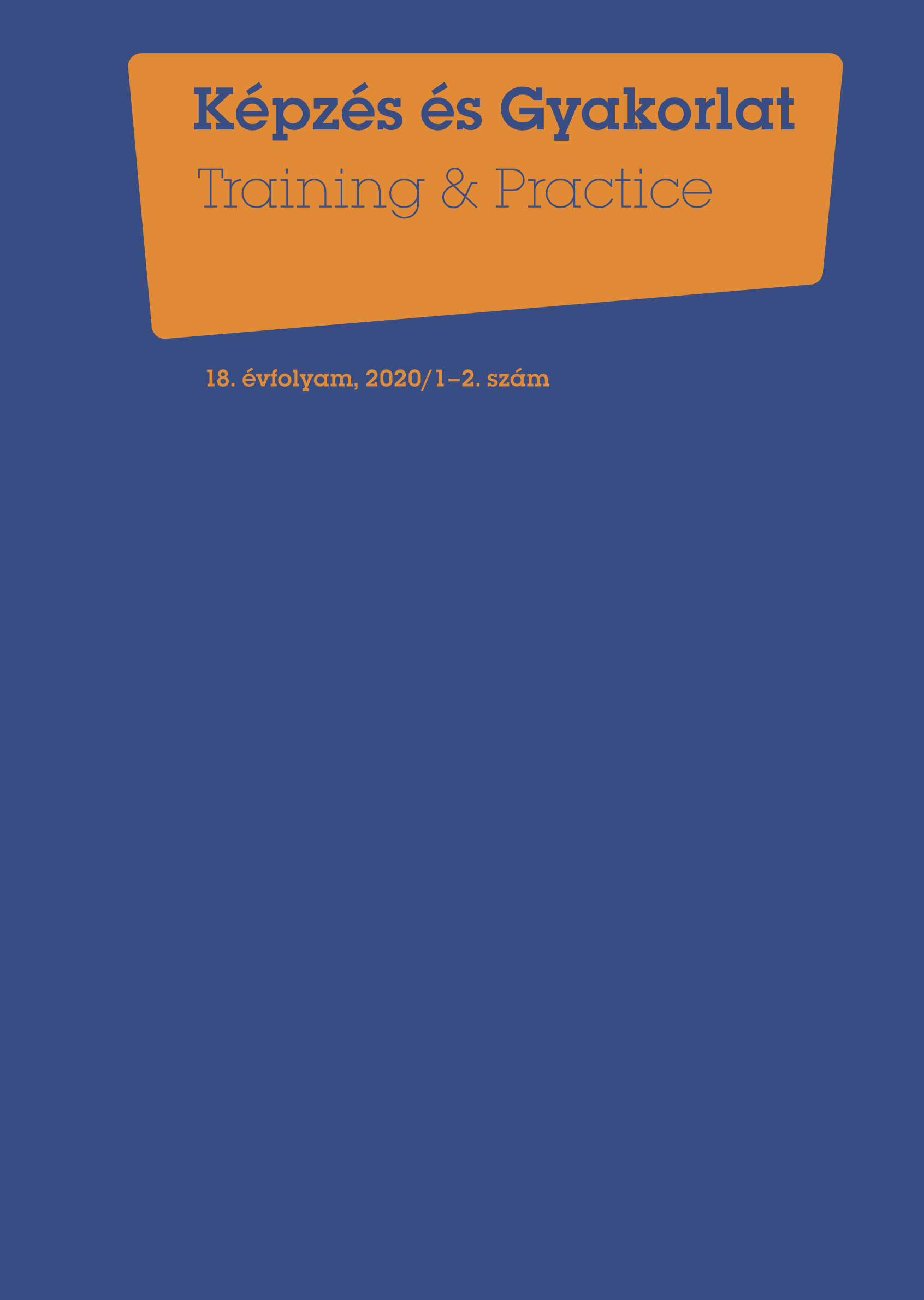Consultancy skills in the light of emotional intelligence and communication skills of students specialised in human resources consultancy
DOI:
https://doi.org/10.17165/TP.2020.1-2.9Absztrakt
In our research we examined two groups of students specialised in human resources studying at University of Győr. We analysed the self-reflective communication developmental plans of 32 students (group 1) because we wanted to learn which communication needs they could identify and are ready to overcome. We also looked at the emotional intelligence of 44 students (group 2) drawing on Bar-On’s model which focuses on the harmony of intrapsychic and interpsychic skills. After comparing the two areas we could identify relations between the self- reflective description of communication and empathy, self-esteem, adaptability and handling stress and emotions. There are also links with age-related characteristics, and it points at the importance of learning through life experience while becoming an effective consultant.
Hivatkozások
Balázs, L. (2014). Érzelmi intelligencia a szervezetben és a képzésben. Budapest: Z-Press Kiadó Kft.
Bar-On, R. (2006). The Bar-On Model of Emotional-Social Intelligence (ESI). [online] https://www.researchgate.net/publication/6509274_The_Bar-On_Model_of_Emotional-Social_Intelligence [10 November 2018]
Bar-On, R. (2012). The Impact of Emotional Intelligence on Health and Wellbeing. In: A. Di Fabio (Ed.), Emotional Intelligence - New Perspectives and Applications, (pp. 29−50). Rijeka: InTech. DOI: https://doi.org/10.5772/32468
Basow, S.A. and Rubenfeld, K. (2003). "Troubles Talk": Effects of Gender and Gender-Typing. Sex Roles, 48. 3-4. pp. 183−187. DOI: https://doi.org/10.1023/A:1022411623948
Borgulya Istvánné, Vető, Á. (2010). Kommunikációmenedzsment a vállalati értékteremtésben. [Communication management in corporate value creation] Budapest: Akadémiai Kiadó.
Boxall, P. and Burch, G. (2007, October). Education for a career in human resource management. Human Resources Magazine, 12. 4. pp. 30-31. [online] http://web.ebscohost.com/ehost/pdfviewer/pdfviewer?sid=c5a963f3-5516-4dcd-84d0-fa05eaaed324%40sessionmgr11&vid=2&hid=11 [3 January 2019]
de Caluwé, L. and Reitsma, E. (2010). Competencies of Management Consultants: A Research Study of Senior Management Consultants. In: Buono, A. F. and Jamieson, D. W. (Eds.), Consultation for Organizational Change, (pp. 15−40). Charlotte, NC: Information Age Publishing.
Caruso, D.R., Mayer, J.D. and Salovey, P. (2002). Relation of a measure of emotional intelligence to personality. Journal of Personality Assessment, 79. pp. 306−20. DOI: https://doi.org/10.1207/S15327752JPA7902_12
Caruso, D. R. and Wolfe, C. J. (2001). Emotional intelligence in the workplace. In: J. Ciarrochi, J. P. Forgas and J. D. Mayer (Eds.). Emotional intelligence and everyday life: A scientific enquiry, (pp. 150-167). New York: Psychology Press.
EAC - Training Standards, Accreditation and Ethical Character. European Association for Counselling, 2002.
Goleman, D. (1998). Working with emotional intelligence. New York: Bantam Books. DOI: https://doi.org/10.1002/ltl.40619981008
Höselbrath, F. (2000). Die Umfrage - 623 Führungskräfte über das Eigenschaftprofil von Beratern und Managern in einem Sieben-Jahres Vergleich 1993/2000. In: Höselbrath, F.- Lay, R.-Arriortua, L.-Ignacio, J. (Eds.), Die Berater: Einstieg. Aufstieg. Wechsel, Frankfurt am Main: Institut für Management, Markt- und Mediainformation.
Kukulu, K.-Buldukoğlu, K.-Kulakaç, Ö.-Köksal, C. D. (2006). The Effects of Locus of Control, Communication Skills and Social Support on Assertiveness in Female Nursing Students. Social Behavior and Personality, 34. 1. pp. 27-40. DOI: https://doi.org/10.2224/sbp.2006.34.1.27
Kuntze, J. et al. (2016). Big Five Personality Traits and Assertiveness do not Affect Mastery of Communication Skills. Health Professions Education, 2. pp. 33-43. DOI: https://doi.org/10.1016/j.hpe.2016.01.009
Kuntze, J. et al. (2018). Mastery of Communication Skills. Does Intelligence Matter? Health Professions Education, 4. pp. 9−15. DOI: https://doi.org/10.1016/j.hpe.2016.08.002
Lakoff, R. T. (1975). Language and woman's place, New York: Harper & Row.
Lasswell, H. D. (1948). The Structure and Function of Communication in Society. In: Bryson, L. (Ed.), The Communication of Ideas, (pp. 37-51). New York: Harper.
Lubinski, D. (2004). Introduction to the special section on cognitive abilities: 100 years after Spearman's (1904) "'General Intelligence, 'Objectively Determined and Measured". Journal of Personality and Social Psychology, 86. pp. 96-111. DOI: https://doi.org/10.1037/0022-3514.86.1.96
Mayring, Ph. (2000). Qualitative Content Analysis [28 paragraphs]. Forum Qualitative Sozialforschung / Forum: Qualitative Social Research, 1. 2. Art. p. 20. [online] http://nbn-resolving.de/urn:nbn:de:0114-fqs0002204 [22 March 2019]
Pearson, J. C. (1985). Gender and communication. Dubuque, I A: William C. Brown. Salovey, P. and Mayer, J. (1990). Emotional intelligence, Imagination, Cognition, and Personality, 9. 3. pp. 185-211. DOI: https://doi.org/10.2190/DUGG-P24E-52WK-6CDG
Salovey, P. and Pizarro, D. A. (2003). The Value of Emotional Intelligence. In: Sternberg, R. J.−Lautrey, J.−Lubart, T. I. (Eds.), Models of Intelligence: International Perspectives, Washington, DC: American Psychological Association.
Society for Human Resource Management. (2016). SHRM elements for HR success: Competency model. [online] forrás [22 March 2019]
Stein, S. J. and Book, H. E. (2000). The EQ Edge: Emotional Intelligence and Your Success. Toronto: Stoddart Publishing.
Thorne, B. and Henley, N. (1975). Difference and dominance: An overview of language, gender, and society. In: Thorne, B.−Henley, N. (Eds.), Language and sex: Difference and dominance, (pp. 5−42). Rowley, MA: Newbury House Publishers.
Tokár-Szadai, Á. (2013). Tanácsadói szerepek, kompetenciák. [Consultancy roles, competencies] Vezetéstudomány, 44. 3. pp. 26−36. DOI: https://doi.org/10.14267/VEZTUD.2013.03.03
Ulrich, D.-Younger, J.-Brockbank, W.-Ulrich, M. D. (2013). The State of the HR Profession. Human Resource Management, 52. 3. pp. 457-471. DOI: https://doi.org/10.1002/hrm.21536
Letöltések
Megjelent
Folyóirat szám
Rovat
License
Copyright (c) 2020 Makkos Anikó, Fehér Ágota, Benyák Anikó

This work is licensed under a Creative Commons Attribution-NonCommercial-NoDerivatives 4.0 International License.








